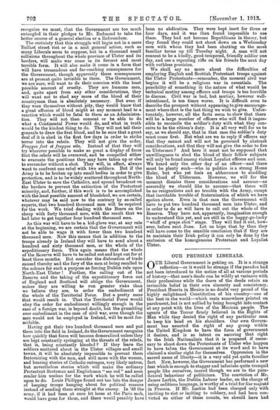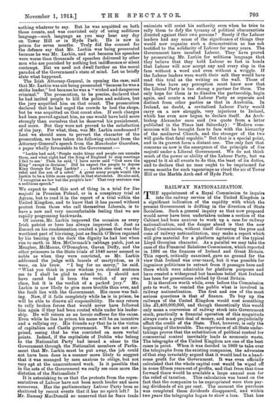OUR PRUSSIAN LIBERALS.
OUR Liberal Government is getting on. It is a strange reflection—or it would be strange if the paradox had not been introduced to the notice of all at various periods of history—that men's deeds can be wildly at variance with their professions while the doers of the deeds retain an invincible belief in their own sincerity and consistency. President Huerta in Mexico is no doubt very proud of the highly enlightened Constitution of his country—one of the best in the world—which rests somewhere printed on parchment, but is not sullied by being brought into contact at any point with the lives of the Mexican people. The agents of the Terror firmly believed in the Rights of Man while they denied the right of any particular man to keep his head on his shoulders. Our own Govern- ment has asserted the right of any group within the United Kingdom to have the form of government it desires, and is so intent on securing that right to the Irish Nationalists that it is prepared if neces- sary to shoot down the Protestants of Ulster who happen to have taken the Government at its word and to have claimed a similar right for themselves. Oppression in the sacred name of liberty—it is a very odd yet quite familiar fact. Now, however, the Government has performed a new feat which is enough to stagger and infuriate quite tranquil people like ourselves, inured though we are to the para- doxical behaviour of politicians. The conviction of Mr. James Larkin, the Dublin Labour leader, on the charge of using seditious language, is worthy of a trial for lese majestel in Prussia. If Mr. Larkin had been charged only with inciting to riot or inciting to robbery, and had been con- victed on either of those counts, we should have had
nothing whatever to say. But be was acquitted on both those counts, and was convicted only of using seditious language—such language as you may hear any day on Tower Hill or in Hyde Park. He is now in prison for seven months. Truly did the counsel for the defence say that Mr. Larkin was being prosecuted because he was Mr. Larkin, and not because his speeches were worse than thousands of speeches delivered by other men who are punished by nothing but indifference or silent contempt. But we need not dwell further on the moral paradox of the Government's state of mind. Let us briefly state what happened. The Irish Attorney-General, in opening the case, said that Mr. Larkin was not being prosecuted "because he was a strike leader," but because he was a "wicked and dangerous criminal." The prosecution, to be precise, declared that he had incited people to kill the police and soldiers, but the jury acquitted him on that count. The prosecution declared that he had urged the crowds to loot the shops, but he was acquitted on that count also. If such charges had been proved against him, no one would have held more strongly than ourselves that he deserved his punishment, and more. But they were not proved to the satisfaction of the jury. For what, then, was Mr. Larkin condemned? Lest we should seem to pervert the character of the prosecution, we have taken the following extract from the Attorney-General's speech from the Manchester Guardian, a paper wholly favourable to the Government :—
"Larkin had said, People make kings and people can unmake them, and what right had the King of England to stop meetings I fail to see.' Then he said, I have never said "God save the King" except in derision.' Did he expect the people to depose King George for King Larkin ? . . . Larkin also said, 41 am a rebel and the son of a rebel.' A great many people would like Larkin to be a little more specific in that statement. He also said, 'I recognize no law but the people's law.' That very sentence was a seditious speech."
We expect to read this sort of thing in a trial for Pse majesto in Prussian Poland, or in a conspiracy trial at Agram, but to read it in the report of a trial within the -United Kingdom, and to know that it has passed without protest from those who call themselves Liberals, is to have a new and very uncomfortable feeling that we are rapidly progressing backwards.
Of course, Mr. Larkin improved the occasion as every Irish patriot or hero has always improved it. Just as Emmet on his condemnation created a phrase that was the worthiest part of his rising, just as Smith O'Brien regained by his bearing in the dock the dignity he had lost when run to earth in Mrs. McCormack's cabbage patch, just as Meagher, McManus, O'Donoghue, Gavan Duffy, and the other prisoners in the State trials of 1848 never seemed so noble as when they were convicted, so Mr. Larkin addressed the judge with laurels of martyrdom, as it were, on his brow. "I beg for no mercy," he said.
Vitat you think in your wisdom you should sentence me to I shall be glad to submit to. I should not have cared had it been the verdict of my own class, but it is the verdict of a packed jury.' Mr. Larkin is now likely to give more trouble than ever, and the fault lies with the Government. His cause was fail- ing. Now, if it fails completely while he is in prison, he will be able to disown all responsibility. He may return to rally broken forces that would never have followed him again if they had been routed while under his leader- ship. He will return as an heroic sufferer for the cause. Even while he lies in prison his name will be an incentive and a rallying cry. His friends say that he is the victim of capitalism and Castle government. We are not sur- prised, seeing that he was convicted on mere verbal points. Indeed, if the capitalists of Dublin who belong to the Nationalist Party had issued a ukase to the Government through the Nationalist members of Parlia- ment that Mr. Larkin must be put away, the job could not have been done in a manner more likely to suggest that it was managed by men anxious to oblige, but not very apt at the unaccustomed work. Is it possible that in the acts of the Government we really see once more the dictation of the Nationalists ?
It is astonishing to us that the protests from the repre- sentatives of Labour have not been much louder and more numerous. Has the parliamentary Labour Party been so shattered by recent events that it has no spirit left ? Is Mr. Ramsay MacDonald so unnerved that he fears trade unionists will resist his authority even when ho tries to rally them to defy the tyranny of political obscurantists directed against their own persons ? Surely if the Labour leaders had any sense of the significance of things they would now organize such a demonstration as has not testified to the solidarity of Labour for many years. The Government have insulted Labour. They have proved by prosecuting Mr. Larkin for seditious language that they believe that they hold Labour so fast in bonds that Labour will now accept any and every slap in the face without a word and even without a wriggle. If the Labour leaders were worth their salt they would have read this trial as the writing on the wall. Those of them who have any perception must know now that the Liberal Party is too strong a partner for them. The only hope for them is to dissolve the partnership, begin again, and create a real Labour Party as separate and distinct from other parties as that in Australia. In Ireland, no doubt, a revitalized Labour Party would carry on a new struggle, very injurious to Ireland, which has even now begun to declare itself. As Arch- bishop Alexander once said (we quote from a letter published in the Times last Saturday) : "Modern com- munism will be brought face to face with the hierarchy of the mediaeval Church, and the stronger of the two will guide that fatal republic." But that is a special point, and in its gravest form a distant one. The only fact that concerns us now is the emergence of the principle of less majestg under a Liberal Government. We do not think much of the power or ability of the Labour Party, but we appeal to it at all events to do this, the least of its duties, and to declare that no man ought to be imprisoned for seven months for such vapourings as cloud the air of Tower Hill or the Marble Arch end of Hyde Park.































































 Previous page
Previous page